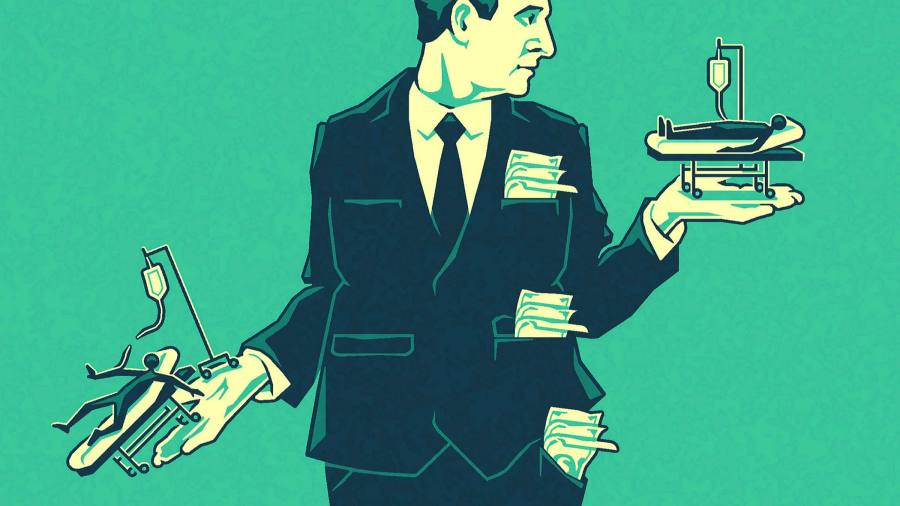Healthcare is on my intellect, in aspect simply because I have used significantly of the last two weeks searching following my husband pursuing a serious operation on his spine. We have been lucky — he had a excellent health care provider, and we have good health insurance plan.
But anytime I spend time in the US health care process, I appear absent imagining what a quagmire of squander and misaligned incentives it is. I feel that is due to the fact the past 50 % century of financialisation in the field has taken it from becoming a mainly charitable services to a body fat personal market, ripe for exploitation.
As with so many matters, Us citizens get both of those the very best and the worst of health care. We have access to the most slicing edge treatments (for all those who can manage it). We also have a program in which two-thirds of the persons who declare personal bankruptcy do so in component mainly because of clinical expenditures, even just after the passing of the Very affordable Health care Act (aka Obamacare). And, as absolutely everyone is familiar with, the US spends far much more than most of the entire world on healthcare, but gets only middling outcomes by OECD criteria.
I dread the bifurcation within just our technique is poised to get even worse. Covid and the guarantee of larger community spending on health care is drawing the sharpest-elbowed traders to an market that doesn’t allocate assets as beautifully as the “invisible hand” of efficiency would advise that it really should. (Whilst, frankly, immediately after 30 years of covering company, I’m really hard pressed to imagine of an business that does.) The unparalleled sums of income sloshing around a difficult and opaque procedure will without doubt make the abundant richer, and the unwell sicker.
Private fairness in distinct is pouring funds into the health care sector, investing $26bn in life sciences and $44bn in medical equipment in 2021, the optimum level in a decade. This follows a 20-fold boost in non-public fairness investing on healthcare bargains — which include leveraged buyouts, progress investments, secondary investments and so on — in between 2000 and 2018, according to an INET doing the job paper produced in 2020.
It’s rather evident why private fairness would see an opportunity in health care, where by there is a desperate have to have to slice expenditures and build efficiency. For several years, non-public equity companies have been buying into hospitals, outpatient care facilities these as urgent treatment centres and emergency rooms, as effectively as health-related billing and credit card debt assortment. They’ve also snapped up high-margin speciality practices these as radiology, anaesthesiology and dermatology.
Nevertheless, selling prices have not occur down — really the reverse. In the meantime, several health care specialists, client advocates and academics say that excellent and access to treatment is declining, as the field consolidates and closes scaled-down procedures in weak or rural locations, pushes physicians to enhance volumes of clients witnessed, and encourages a lot more costly diagnostic tests and the use of much less highly-priced (but normally shoddier) gear.
I know some physicians who are relieved to just hand in excess of their reams of paperwork to someone else so they can emphasis exclusively on sufferers. I also know a selection of healthcare experts who have still left practices just after non-public equity takeovers, as they felt they had been underneath way too a lot time tension to present higher top quality care. Undoubtedly, a lot of medical doctors and people alike are weary of battling coverage corporations for important, albeit expensive, treatments.
To be fair, the conditions of the American professional medical program cannot be blamed fully, or even generally, on the personal equity industry. But the point that a public excellent these types of as healthcare (or other folks these as education or housing) has been turned into a little something that can be spliced, diced and bought just like a retail store or a factory is not assisting us build value-saving competition. Without a doubt, it is just developing a new and far more harmful place for hire-in search of.
As teachers Eileen Appelbaum and Rosemary Batt lay out in a Middle for Financial and Policy Investigation paper on the financialisation of the health care program, these challenges have been brewing for a long time.
They begun in the 1960s, when for-financial gain care was, for the first time, funded by govt and other 3rd-celebration payers. As general public funding waxed and waned, traders would get into hospitals and nursing residences, and then flip them for financial gain when it suited. In some situations, this involved employing the type of actual estate leverage design deployed in retail: capitalising on a business’ bricks and mortar property, fairly than attempting to increase it.
Alternatively, private equity companies would peel off and consolidate the higher margin stuff and slice again on the primary care. Most likely this is why it’s a lot easier in some neighbourhoods to come across an individual featuring Botox than a GP taking new patients. Hard cash-only “concierge” methods that sidestep the insurance program are also ever more the norm.
Now, the outcomes of Covid and the guarantee of a lot more federal investing on wellbeing are fuelling investor interest in spots such as psychiatry techniques, home health care and even hospice treatment. Potential risks lie forward. “Think about how personal equity will make cash in something like a hospice,” says Appelbaum. “They’ll slice the seasoned staff members qualified to enable households have an understanding of and cope with the procedure of dying, and use folks who may be equipped to enable clean the house.” Welcome to healthcare, American type.
Indication up for Rana’s US politics newsletter, Swamp Notes, ft.com/newsletters
Letter in reaction to this posting:
Canada healthcare proves the market is not the heal / From Mark A Wolfgram, Ottawa, ON, Canada





